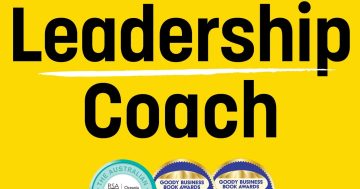Rachel Tenenbaum* says the number one voice certain to drive people’s leadership off the deep end may be their own.
 “You are not the voice of the mind; you are just the one that hears it.” –Michael Singer
“You are not the voice of the mind; you are just the one that hears it.” –Michael Singer
One of the most astute and celebrated quotes in the personal and professional development realm, Michael Singer speaks a truth that transforms – lives, leadership, and minds – in a simple sentence.
The first time I read this quote, I resisted it, feeling that it was a radically preposterous claim: Who am I if not the voice of the mind?
Years later, it has helped an astounding number of my clients’ lives, and it’s a premise I continue to explore and reflect on regularly.
And I am not alone.
Multiple TEDTalk speakers, authors, and coaches like Shirzad Chamine and Tara Mohr, psychologist Ethan Kross, and psychologist/NYT bestselling author Rick Hanson are a few of the many who are cultivating a greater awareness of this pivotal life and leadership transforming truth: This voice is not you but instead the militant teachers, demoralising colleagues or leaders, hypercritical parents, or detrimental societal norms from your past.
I argue that we do not have one naysaying voice, but a few who incessantly chatter: analytical commentators who thrive most when they instigate and influence nearly every move.
Activated by the areas of the brain that constantly scan for threats, these voices intend to keep you safe.
They insist their advice makes life “easy,” but instead of being helpful, these voices are like tweens claiming they are expert drivers: Give them the wheel and you are bound to crash, and likely incite a pileup on the nearest interstate.
These voices do not belong in the boardroom, at home, or in your car, and they certainly should not dictate your decision-making.
These voices drive (and are driven by) fear, insecurity, self-righteousness, resentment, ego, and so much more.
They bully, delay, and stop you from leading. They undermine your authority and creativity, hijack your confidence, and destabilize your effectiveness.
For some, they judge or belittle, and are the echo that seeds endless doubt:
Who do you think you are?
Do you really think they will buy that pitch?
Your team is sliding, your tactics are terrible, and it’s all your fault.
For others, they are the voices that bully and push, convincing you that the only way to achieve your goals is to bulldoze over everyone, ignore policies, and reject the guidance of others.
The aftermath leaves a destructive mess, and mitigates your actual objectives.
No matter the approach, they sabotage rational executive function, crippling your ability to see and think clearly.
Your capacity to reason and to reflect declines and your ability to creatively problem-solve retreats with it.
These voices create divides – within ourselves, and with others.
For many, they have been around for so long, they’ve seamlessly woven themselves into the fabric of our minds and our lives.
Research estimates that we have approximately 50,000 – 70,000 thoughts a day: 80 per cent of those come from the negative voices, habitually undermining our self-confidence and self-authority.
Without critical awareness, when we blindly listen to and believe we are these voices, they win, every time.
Knowing these voices will not disappear, how do you live, lead, and even harness the best of these voices?
First, pause and take a breath.
Then, detach and acknowledge their presence.
And finally, question with sincere curiosity.
Since the voices are linked to the emotional areas of the brain, that conscious pause and breath begin to quiet the anxious activity, enabling you to create distance between yourself and the chatter.
As you detach, you transform the conditioned, reflexive judgment (of yourself and others) into healthy discernment.
You begin to see the voices for what they are: mere thoughts muddied in layers of fear and reactionary theories.
With time, this mindful awareness coupled with sincere curiosity enables you to not only identify the reflexive drivers, but also the kernels of wisdom and insight buried beneath.
“Your team is sliding, your tactics are terrible, and it’s all your fault” becomes “the team needs a pick-me-up, and my reflexive berating is not helping.
“We need to reconnect to our team’s values and goals, and creatively assess this issue together.”
“Do you really think they will buy that pitch?” which only begs a black and white answer with no room for vision, becomes “what would take this pitch to the next level?”
Perhaps even realising that nothing else is needed, when you look with clear sight.
And finally, that bulldozing style diminishes, turning into a strategic approach, fostering collaboration and long-term buy-in.
These skills – the ability to pause, detach, listen, observe, and accurately question and discern – are essential skills for every leader to cultivate; they are also the fundamental building blocks of mindfulness.
One of the most powerful, underutilized accelerators to leadership, mindfulness not only trains each of these critical skills but also enables you to assess who should be driving the car of your life.
By mindfully placing the strong, intentional, wise, and aware voice at the helm, you’ll achieve more, react less, and lead with greater clarity.
*Rachel Tenenbaum is a certified professional coach and facilitator. Her focus is on leadership development and personal development in and outside organisations.
This article first appeared at ellevatenetwork.com.











